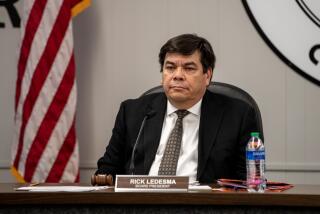Teachers in Japan fight being forced to sing national anthem
Japanese public high school teacher Sawa Kawamura used to smile on her way to work. But in recent years, this quiet woman has come to dread the classroom.
In 2004, Kawamura, a slender fiftysomething teacher with long black hair, refused to stand and sing while the national anthem was played. She was given a formal warning that she had defied instructions from her superiors. The notice remains on her record and could haunt her when she is up for rehiring.
“It’s only twice a year, during formal school ceremonies, that we’re ordered to sing the anthem,” Kawamura said, “but it has changed relations at work.”
Tokyo Gov. Shintaro Ishihara, known for his nationalism, mandated in 2003 that teachers in public high schools and other institutions who refuse to stand up, face the flag and sing the country’s national anthem during school ceremonies should be reprimanded.
Kawamura’s superiors have been assigning her duties that limit her interaction with students and remove her from school ceremonies entirely. So, after teaching for 20 years, she has been unable to see her students graduate. She feels like a pariah.
“I don’t harbor ill feelings for the anthem. It’s about being forced,” Kawamura said. “This shouldn’t be allowed in a democracy.”
Many teachers agree.
On Saturday, scores of public school teachers gathered in central Tokyo to develop a plan to wage an uphill battle against the Tokyo government and its school board. About 400 teachers have joined a class-action lawsuit, now headed to the Supreme Court, against the enforced patriotism.
“Mandating singing of the national anthem at ceremonies is spreading throughout the country, but it’s only in Tokyo where a punishment is clearly written in as a policy and the penalties severe,” said Bunya Kato, a lawyer representing teachers in their suit.
Punishment for Tokyo teachers starts with a warning and then escalates to pay cuts, suspension from work and, finally, job termination.
Other municipalities clamping down on disobedient teachers include Hiroshima, Osaka and Kanagawa.
“Japan’s flag and national anthem is symbolic of the country’s militaristic past and, to many, signify the country’s former allegiance to the emperor,” said Keigo Komamura, law professor at Keio University. Demanding that teachers stand and sing “is a violation of their freedom of thought.”
Japan’s five-line anthem is a tribute to its emperor. The first part of the song says: “May your reign continue for a thousand, eight thousand generations.”
There are about two dozen legal cases against enforced patriotism pending, from district court to the Supreme Court level, with teachers questioning the constitutional validity of being forced to stand and sing. Most of the lawsuits are asking for all penalties to be rescinded and for compensatory damages.
So far, the courts have backed the school boards and not the teachers. Legal experts say it won’t be easy for teachers to get a favorable ruling.
“The court is arguing that the ‘act’ of being forced isn’t denying an individual from what the individual actually believes in,” Komamura said.
“In Japan, it’s often the case that decisions that come from the top must be obeyed,” said Hiroshi Nishihara, law professor at Waseda University who has served as counsel to public school teachers in the past. Employees, particularly those in the public sector, are obliged to adhere to their bosses’ orders, he said.
Yet observers also note there is reason for the teachers to keep fighting.
In 1996, the Japanese Supreme Court ruled in favor of protecting a Jehovah’s Witness student’s right to freedom of religion at a public high school.
“The judge ruled it was wrong to force an act that was against an individual’s religion, and that the school needed to explore alternatives so rights wouldn’t be infringed,” Komamura said. “The teachers have a chance.”
Nagano is a special correspondent.
More to Read
Start your day right
Sign up for Essential California for news, features and recommendations from the L.A. Times and beyond in your inbox six days a week.
You may occasionally receive promotional content from the Los Angeles Times.






